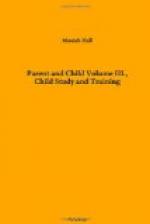Heredity also endows a person with his peculiar temperament, with his good or bad looks, and with the chief components of what is called personality. On the other hand, training and education have almost everything to say respecting the relative standing of the individual among the members of his kind—whether or not he shall be a blighted or a perfect specimen. A fine, sweet, juicy crabapple is more desirable than a scrubby, diseased Jonathan.
It is the province of training and education to take the individual as he is born, and endeavor to make of him a perfect specimen of his kind. “A child left to himself bringeth his parents to shame.” If left alone or improperly trained, a child is almost certain to revert to a lower type of individual. The same high possibilities that, properly directed, produce the superior being, if neglected, or subjected to a vicious environment, produce the moral degenerate. The child is born morally neither good nor bad, and while inherited tendencies may make development in one direction easier than in another, it is possible for a favorable environment, assisted by education, to develop any normal child into a sweet, wholesome product of his kind.
Shearer in his “Management and Training of Children,” says: “The child may inherit instincts, but a kind Providence has ordained that he shall not inherit habits. He may inherit certain tastes, but he does not inherit temptation. He may bring into the world tendencies, but he does not bring with him prejudices.”
LESSON I
Questions for Discussion
1. What does the expression “being well-born” mean to you?
2. What responsibility is laid upon parents by the fact that the child is the product of the past? Read the second commandment here and discuss its significance in application to this point.
3. What are some of the instincts and capacities given to the child by heredity?
4. Explain the difference between an instinct and a capacity. What seems to be the source of our instincts?—our capacities?
5. What are the chief limitations placed by heredity upon the child?
6. What may education and environment hope to accomplish?
References: “The Right of the Child to be Well Born,” will be found a helpful book to study here. It may be well, if the book is available, to have someone appointed to report on it or to read a few choice paragraphs from it. Also read “Being Well Born,” by Guyer.
IMPORTANT LAWS OF HEREDITY
A Wise Application of the Laws of Inheritance Is the Most Certain Means of Developing a Superior Race




